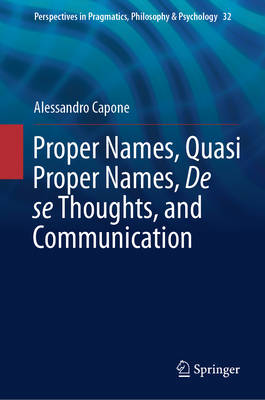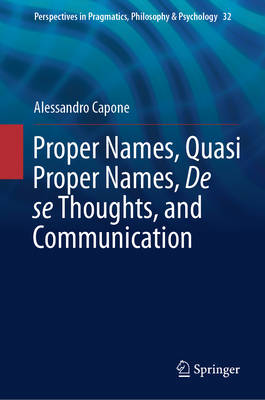
- Afhalen na 1 uur in een winkel met voorraad
- Gratis thuislevering in België vanaf € 30
- Ruim aanbod met 7 miljoen producten
- Afhalen na 1 uur in een winkel met voorraad
- Gratis thuislevering in België vanaf € 30
- Ruim aanbod met 7 miljoen producten
Proper Names, Quasi Proper Names, de Se Thoughts, and Communication
Alessandro CaponeOmschrijving
This book offers an in-depth exploration of proper names, quasi-proper names, de se thoughts, and communication, offering a comprehensive analysis of how proper names function within language. Aimed at scholars in the philosophy of language and linguistics, it delves into the distinction between referential acts and referential presuppositions,highlighting the involvement of conceptual components. The book examines the use of proper names in various linguistic contexts, including their role in speech acts, the evolution of names, and the interplay between direct reference and conceptual dimensions. It also explores the unique functions of proper names in assertions and non-assertive speech acts, such as calling and scolding. By analyzing primary and secondary data, the book enhances understanding of nominal categorization and the grammatical features of proper names, addressing the challenges of learning and using them. This book significantly contributes to the broader field of linguistics, offering new perspectives on the semantics of de se structures, quasi-proper names, and the pragmatic presuppositions associated with proper names.
Specificaties
Betrokkenen
- Auteur(s):
- Uitgeverij:
Inhoud
- Aantal bladzijden:
- 138
- Taal:
- Engels
- Reeks:
- Reeksnummer:
- nr. 32
Eigenschappen
- Productcode (EAN):
- 9783031950124
- Verschijningsdatum:
- 17/10/2025
- Uitvoering:
- Hardcover
- Formaat:
- Genaaid
- Afmetingen:
- 164 mm x 238 mm
- Gewicht:
- 285 g

Alleen bij Standaard Boekhandel
Beoordelingen
We publiceren alleen reviews die voldoen aan de voorwaarden voor reviews. Bekijk onze voorwaarden voor reviews.








